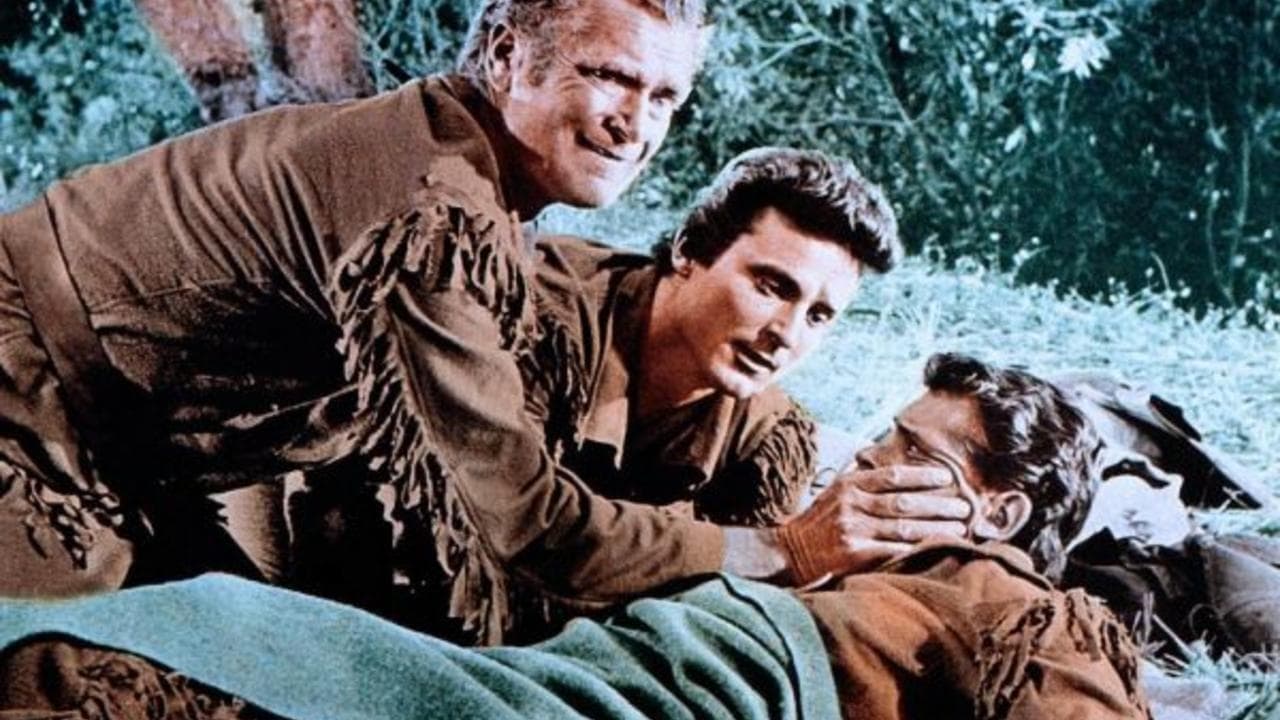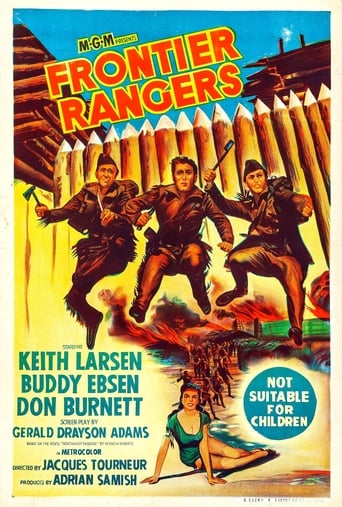Incannerax
What a waste of my time!!!
Ameriatch
One of the best films i have seen
Deanna
There are moments in this movie where the great movie it could've been peek out... They're fleeting, here, but they're worth savoring, and they happen often enough to make it worth your while.
Aryana
Easily the biggest piece of Right wing non sense propaganda I ever saw.
max von meyerling
The lack of 'scope (in more ways than one) betrays the TV origins of this film. Though mainly shot in a studio or on the back lot, brief sequences shot on location recall the classic version of LAST OF THE MOHEGANS (1920) by Jacques Tourneur's father Maurice. Though its from the same source novel as the attenuated 1940 epic, the euphonious NORTHWEST PASSAGE starring Spencer Tracy, it bares more resemblance to the High Tide of the TV western's tsunami of the late 50s and early 60s. They were photographed on sound stages with mercilessly bright overhead lighting, the lead actor (Kieth Larson) is the type of chiseled profile hunk that men who control such things think women will fancy (no stupid, not Gardner McKay but Dustin Hoffman. Are you crazy?) but only appeal to pre-teen boys. His sidekick is Buddy Ebson, late of playing the sidekick to Fess Parker's Davy Crockett in a series of sensationally popular TV movies for Disney. This represented a major re-branding of Ebson's career from being a song and dance man. His career would shortly enter a new phase as Jed Clampett on the Beverly Hillbillies. As they say, sometimes good casting can overcome mediocre writing. But not here.Tourneur is operating at a different level than his true features. One cameraman he worked with complimented once him as a true artist because he made a new set-up for every shot. Not so here. Of course being re-edited from a TV series, the structure is highly episodic, with each new setting a completely different set of supporting actors appear, never to re-appear. There is one location, where the canoe would be beached in scene after scene after scene, which was merely a set on the back lot beside the studio tank which would have to be redressed to pass it off as yet another place, sometimes quite remarkably well done.Northwest Passage is not among my favorite pictures but place it side by side with Frontier Rangers and its an object lesson in not only the aesthetic results of severely constraining the budget, but the very one dimensional output of a film due to the limited and constricted imaginations of those who planned to make this stuff in the first place. All very professional so it doesn't resemble a movie which is bad because of incompetence. Here the badness is inherent just because of meanness, cynicism and expediency. It calls to mind Sam Goldwyn's warning to the film industry when TV first arrived- Who's gonna want to go out to a theater and pay to see a bad movie when they can stay home and see a bad movie for free. This is a bad movie.And oh, this film has the second worst song to appear in any film made in the twentieth century. The theme song is over-the-top terrible made even more remarkable in that it is a product of the first rate, hall of fame even, song writing team of Dietz and Schwartz. It is excrementally bad and for fans of the extreme its a must-not-miss. "Make way for Rangers/Tomahawk, tomahawk here we come". (The dreadful background music was by the incredibly prolific hack Raoul Kraushaar).
anonymous_007
When will Hollywood ever learn not to remake a great movie? The answer is, probably never.The 1940 version of this movie, with Spencer Tracy, is excellent. Why do a cheap knockoff?It looks like they might have used the same costumes, probably from Western Costume, because they appear to be identical.You get to see Angie Dickinson with dark hair, which might be her natural hair color. She is really young and beautiful here, something you might not known if you first saw her in "Police Woman."In any event, it just makes me sad, that Hollywood has the money to make movies, and instead of tackling new scripts, they just keep rehashing the old.
Tryavna
At first glance, this cheap, cheesy, episodic film might seem like a career low-point for director Jacque Tourneur, the man who had helped Val Lewton establish the psychological horror genre with "Cat People" and "I Walked with a Zombie" and who had made the prototypical film noir "Out of the Past." Here, we find Tourneur working with cardboard sets and cardboard actors. Only the most committed auteurists are going to find any hint of Tourneur's underrated genius. By this time, he had fallen off the map as an A-list director, largely because of his willingness to lower his own salary to make the films he wanted to make, but he was still able to get work at the major Hollywood studios. In this case, MGM.But what neither of the other reviewers has pointed out, and what saves this movie slightly, is that it's actually not a movie at all. It's a medley of the first three episodes of the TV series "Northwest Passage," which ran for one season (1958-59). In those days, the major studios tried their hands at making TV series, usually with little success. This time, when the series ran its course, MGM cobbled together three different movies out of all the episodes, of which "Frontier Rangers" was the first. (The other two were "Mission of Danger" and "Fury River.") MGM probably unloaded these movies onto the drive-in market or as the second half of double bills.Consequently, "Frontier Rangers" doesn't stand up very well as a movie. Tourneur had neither the resources nor the time to put together a quality show, and he had to settle for poorly lit scenes, supplemented by stock footage from MGM's earlier, far better 1940 film "Northwest Passage" (starring Spencer Tracy, and directed by King Vidor), upon which this series was loosely based. (Rather than watch any of these three films, I recommend that you try to catch the Tracy/Vidor flick instead.) Characters come and go without warning in "Frontier Rangers," and the sets are so flimsy that they move around during fight scenes. Were you to watch this in its original TV-series format, however, you should double my 3-star rating. It's about as good as other TV series in the "Western" genre (broadly defined). And it has Buddy Ebsen in the cast, which is a major plus!Nevertheless, even as a patchwork movie, "Frontier Rangers" is interesting -- if for no other reason than the glimpse into 1950's values it provides. Remember, this was made before the Women's, Youth, and Civil Rights movements of the 1960s. So we get some fascinating insights into post-WWII attitudes about race, gender, and U.S. foreign policy: the authoritarian, militaristic virtues of Maj. Rogers; the fear of "indian" contamination of white blood, women, and culture; the submissiveness of long-suffering women who simply do not understand the importance of war and the pioneering spirit; etc. But of course, if you're whiling away 90 minutes on a rainy Saturday afternoon, you don't need to think so seriously about "Frontier Rangers." But I doubt you'll be able to make it all the way through without your mind wandering to some of these issues.
silverauk
Jacques Tourneur was at the height of his career when making this movie. He was making the T.V.-series "Bonanza" and the "Twilight Zone" at the same time in the same year! The former colony of the English Crown was battling the Indians and the French in the north of New-York. The Algonkin Indians with their impressive chief Black Wolf (Larry Chance) fought against special troops, the predecessors of the Rangers under the leadership of General Armherst (Philip Tonge). Major Robert Rogers (Keith Larsen) conducts his Frontier Rangers, who consists mainly of trappers, along the borderline of America occupied by the French and their Indian allies. I was astonished by the trade of women at that time, a commerce of humans in the form that you could buy a woman. The taverns on the border were not only places of trade for furs and furniture but also the place where a dishonest innkeeper could arrange a marriage at a fixed price against the will of the bride. Spoiler: The end of the movie with the massacring of the tribe could be described by nowaday-standards as a form of holocaust but in the perspective of that time it was just a revenge for the hundreds of border-families killed by the Indians. This adventure-movie gives after all a rather precise image of the Eastern part of the U.S. at the beginning of the 18th century.

